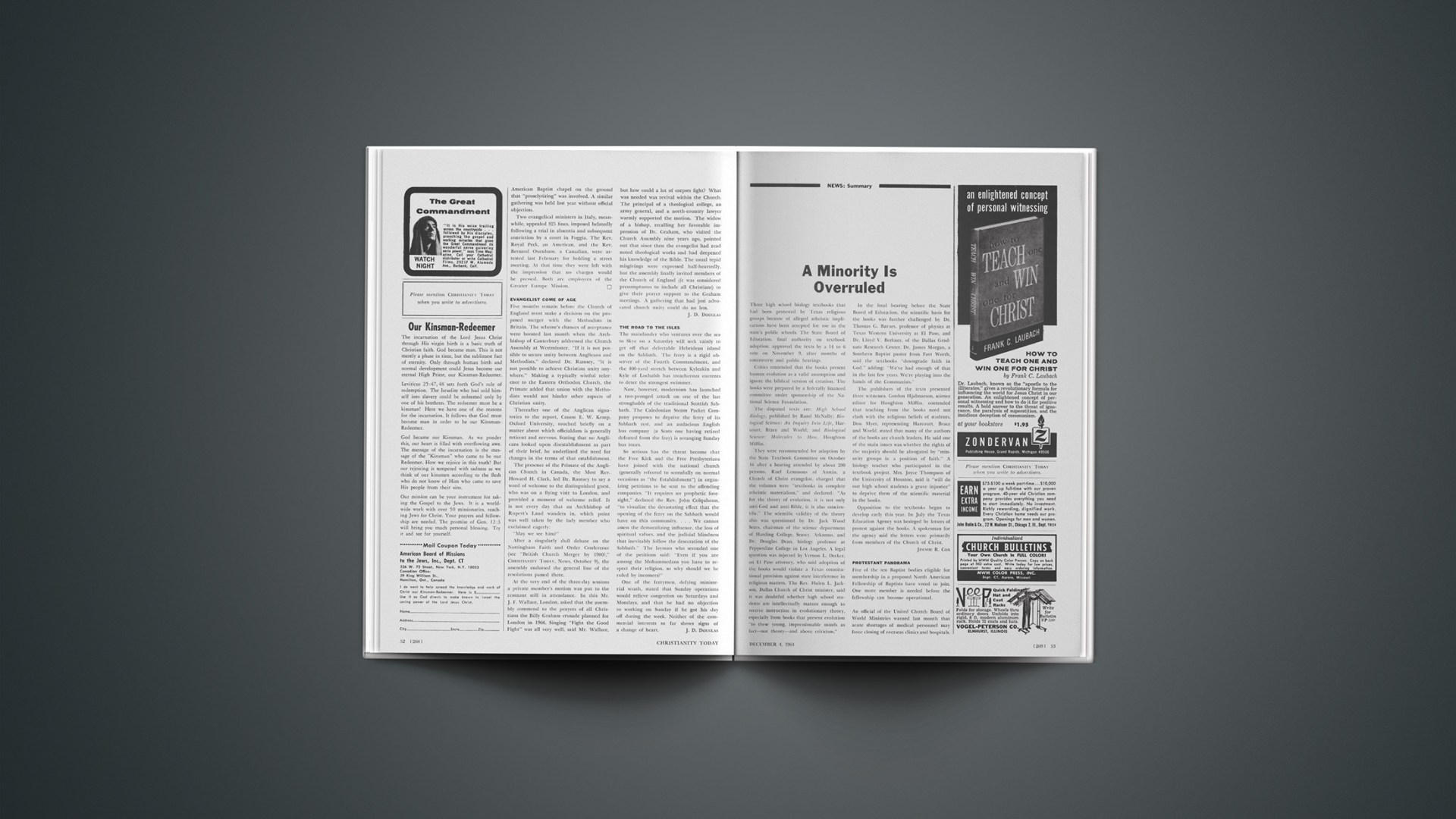Evangelist Come Of Age
Five months remain before the Church of England must make a decision on the proposed merger with the Methodists in Britain. The scheme’s chances of acceptance were boosted last month when the Archbishop of Canterbury addressed the Church Assembly at Westminster. “If it is not possible to secure unity between Anglicans and Methodists,” declared Dr. Ramsey, “it is not possible to achieve Christian unity anywhere.” Making a typically wistful reference to the Eastern Orthodox Church, the Primate added that union with the Methodists would not hinder other aspects of Christian unity.
Thereafter one of the Anglican signatories to the report, Canon E. W. Kemp, Oxford University, touched briefly on a matter about which officialdom is generally reticent and nervous. Stating that no Anglicans looked upon disestablishment as part of their brief, he underlined the need for changes in the terms of that establishment.
The presence of the Primate of the Anglican Church in Canada, the Most Rev. Howard H. Clark, led Dr. Ramsey to say a word of welcome to the distinguished guest, who was on a flying visit to London, and provided a moment of welcome relief. It is not every day that an Archbishop of Rupert’s Land wanders in, which point was well taken by the lady member who exclaimed eagerly:
“May we see him?”
After a singularly dull debate on the Nottingham Faith and Order Conference (see “British Church Merger by 1980?,” CHRISTIANITY TODAY, News, October 9), the assembly endorsed the general line of the resolutions passed there.
At the very end of the three-day sessions a private member’s motion was put to the remnant still in attendance. In this Mr. J. F. Wallace, London, asked that the assembly commend to the prayers of all Christians the Billy Graham crusade planned for London in 1966. Singing “Fight the Good Fight” was all very well, said Mr. Wallace, but how could a lot of corpses fight? What was needed was revival within the Church. The principal of a theological college, an army general, and a north-country lawyer warmly supported the motion. The widow of a bishop, recalling her favorable impression of Dr. Graham, who visited the Church Assembly nine years ago, pointed out that since then the evangelist had read noted theological works and had deepened his knowledge of the Bible. The usual tepid misgivings were expressed half-heartedly, but the assembly finally invited members of the Church of England (it was considered presumptuous to include all Christians) to give their prayer support to the Graham meetings. A gathering that had just advocated church unity could do no less.
The Road To The Isles
The mainlander who ventures over the sea to Skye on a Saturday will seek vainly to get off that delectable Hebridean island on the Sabbath. The ferry is a rigid observer of the Fourth Commandment, and the 400-yard stretch between Kyleakin and Kyle of Lochalsh has treacherous currents to deter the strongest swimmer.
Now, however, modernism has launched a two-pronged attack on one of the last strongholds of the traditional Scottish Sabbath. The Caledonian Steam Packet Company proposes to deprive the ferry of its Sabbath rest, and an audacious English bus company (a Scots one having retired defeated from the fray) is arranging Sunday bus tours.
So serious has the threat become that the Free Kirk and the Free Presbyterians have joined with the national church (generally referred to scornfully on normal occasions as “the Establishment”) in organizing petitions to be sent to the offending companies. “It requires no prophetic foresight,” declared the Rev. John Colquhoun, “to visualize the devastating effect that the opening of the ferry on the Sabbath would have on this community.… We cannot assess the demoralizing influence, the loss of spiritual values, and the judicial blindness that inevitably follow the desecration of the Sabbath.” The layman who seconded one of the petitions said: “Even if you are among the Mohammedans you have to respect their religion, so why should we be ruled by incomers?”
One of the ferrymen, defying ministerial wrath, stated that Sunday operations would relieve congestion on Saturdays and Mondays, and that he had no objection to working on Sunday if he got his day off during the week. Neither of the commercial interests so far shows signs of a change of heart.










